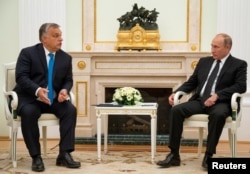Russia has reiterated its commitment to investing tens of billions of dollars in Hungary's energy sector, despite the ongoing European sanctions against Moscow. Russian President Vladimir Putin backed the deal Tuesday after hosting Hungarian Prime Minister Viktor Orban at the Kremlin.
Orban said his country's relationship with Russia was of great importance.
"I am very glad that over the last years we have had balanced, predictable relations," he told Putin.
Hungary's European Union partners see relations with Russia very differently and the bloc has enacted a raft of sanctions against Moscow following its 2014 forceful annexation of Ukraine's Crimea region.
Orban's visit to Moscow was primarily about economic ties, said Ian Bond of the London-based Center for European Reform.
"Hungary is one of the most dependent countries in Europe on Russia for its energy supplies. Not just for its gas — and I think it gets about three-quarters of its gas from Russia — but also because more than half of its electricity comes from nuclear plants, and 100 percent of the fuel for those nuclear plants comes from Russia. So it's very easy for the Russians to remind the Hungarians that a cold winter is coming if they want to exercise political leverage," Bond told VOA in an interview.
After private talks at the Kremlin, Putin reiterated Russia's commitment to investing in Hungary through its state-owned nuclear giant.
"Rosatom will start constructing two new energy units at the Paks nuclear power plant in the nearest future," he told reporters.
The Paks nuclear project has caused alarm in Brussels, noted analyst Ian Bond.
"Hungary is taking out a large Russian loan to cover the cost of it. This is something which ... the European Commission resisted and tried to block. Eventually, the commission grudgingly cleared the deal, but it's now running into delays, cost overruns and the like."
As Hungary warms to Moscow, relations with Brussels are increasingly icy. EU lawmakers voted last week to initiate Article 7 punitive measures against Budapest for flouting the bloc's treaties on the rule of law.
While Hungary has repeatedly spoken out against sanctions on Russia, so far Orban has resisted voting against the measures in the European Council, a move that would in effect veto them.
"But it may be that as part of thumbing his nose at the rest of Europe now that he faces sanctions over the rule of law, that he may decide that he can actually afford to block the sanctions on Russia the next time they come up for renewal," Bond said.
For now, it seems the Hungarian leader is not ready to take such a dramatic step, despite such close relations with Moscow.






